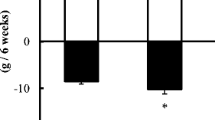Abstract
The objective of the present study was to determine the effects of exercise and zinc deficiency on some elements in rats. Forty adult male Sprague–Dawley species male rats were allocated to four groups as follows: Group 1: control, Group 2: zinc-deficient, Group 3: exercise in which exercise group fed with a normal diet, Group 4: zinc-deficient exercise, exercise group fed by a zinc-deficient diet for 15 days. After the procedure ended, rats in groups 3 and 4 were exercised on the treadmill for 60 min at a speed of 6 m/min until the exhaustion. The rats were decapitated 48 h after exercise together with their controls, and blood samples were collected to determine copper (Cu), iron (Fe), magnesium (Mg), calcium (Ca), and phosphorus (P) levels. The highest Cu and Fe values in the serum were obtained in group 2 (p < 0.01). The levels of these elements in group 4 were lower than those in group 2 and higher than the levels in groups 1 and 3 (p < 0.01). Serum Mg levels did not differ significantly between groups. Group 4 had the lowest serum Ca and P levels (p < 0.01). These same parameters in Group 2 were higher than those in group 4 but significantly lower than those in groups 1 and 3 (p < 0.01). There was no significant difference between Ca and P levels of groups 1 and 3. The results of the study indicate that zinc deficiency adversely affects copper, iron, calcium, and phosphorus mechanisms and that these adverse effects much more marked after an effort exercise.
Similar content being viewed by others
References
Brotherhood JR (1984) Nutrition and sports performance. Sports Med 1:350–389
Short SH, Short WR (1983) Four-year study of university athletes’ dietary intake. J Am Diet Assoc 82:632–645
Finstad EW, Newhouse IJ, Lukaski HC, McAuliffe JE, Stewart CR (2001) The effects of magnesium supplementation on exercise performance. Med Sci Sports Exerc 33:493–498
Cordova A (1992) Variations in serum iron and fatigue levels after elective abdominal surgery. Med Sci Res 20:119–120
Dressenderfor RH, Wade CE, Keen CL, Scaff JH (1982) Plasma mineral levels in marathon runners during a 20-day road race. Phys Sportsmed 10:113–118
Couzy F, Lafargue P, Guezennec CY (1990) Zinc metabolism in the athlete: influence of training nutrition and other factors. Int J Sports Med 11:263–266
Haralambie G (1981) Serum zinc in athletes in training. Int J Sports Med 2:135–138
Khaled S, Brun JF, Cassanas G, Bardet L, Orsetti A (1999) Effects of zinc supplementation on blood rheology during exercise. Clin Hemorheol Microcirc 20:1–10
Cordova A, Alvarez-Mon M (1995) Behaviour of zinc in physical exercise: a special reference to immunity and fatigue. Neurosci Biobehav Rev 19:439–445
Cordova A, Navas FJ (1998) Effect of training on zinc metabolism: changes in serum and sweat zinc concentrations in sportsmen. Ann Nutr Metab 42:274–282
McDonald R, Keen CL (1988) Iron, zinc and magnesium nutrition and athletic performance. Sports Med 5:171–184
Khaled S, Brun JF, Micallel JP, Bardet L, Cassanas G, Monnier JF et al (1997) Serum zinc and blood rheology in sportsmen (football players). Clin Hemorheol Microcirc 17:47–58
Ma ZJ, Yamaguchi M (2001) Role of endogenous zinc in the enhancement of bone protein synthesis associated with bone growth of newborn rats. J Bone Miner Metab 19:38–44
Yamaguchi M, Gao YH, Ma ZJ (1999) Synergistic effect of genistein and zinc on bone components in the femoral–metaphyseal tissues of female rats. J Bone Miner Metab 18:77–83
Fischer PW, Giroux A, L’Abbe MR (1984) Effect of zinc supplementation on copper status in adult man. Am J Clin Nutr 40:743–746
Haymes EM (1991) Vitamin and mineral supplementation to athletes. Int J Sport Nutr 1:146–169
Marrella M, Guerrini F, Solero PL, Tregnaghi PL, Schena F, Velo GP (1993) Blood copper and zinc changes in runners after a marathon. J Trace Elem Electrolytes Health Dis 7:248–250
Golub MS, Gershwin ME, Hurley LS, Baly DL, Hendrickx AG (1984) Studies of marginal zinc deprivation in rhesus monkeys. I. Influence on pregnant dams. Am J Clin Nutr 39:265–280
Fushimi H, Inoue T, Yamada Y, Horie H, Kameyama M, Minami T et al (1993) Zinc deficiency exaggerates diabetic osteoporosis. Diabetes Res Clin Pract 20:191–196
O’Dell BL, Emery M, Xia J, Browning JD (1997) In vitro addition of glutathione to blood from zinc-deficient rats corrects platelet defects: impaired aggregation and calcium uptake. J Nutr Biochem 8:346–350
Kimmel PL, Watkins DW, Gubish CT, Slatopolsky E, Langman CB (1991) Zinc nutritional status modulates the 1, 25-(OH)2D. Response in uremic rats. Miner Electrolyte Metab 17:307–314
Baltaci AK, Uzun A, Kilic M, Mogulkoc R (2009) Effects of acute swimming exercise on some elements in rats. Biol Trace Elem Res 127:148–153
Author information
Authors and Affiliations
Corresponding author
Rights and permissions
About this article
Cite this article
Baltaci, A., Gokbel, H., Mogulkoc, R. et al. The Effects of Exercise and Zinc Deficiency on Some Elements in Rats. Biol Trace Elem Res 134, 79–83 (2010). https://doi.org/10.1007/s12011-009-8452-4
Received:
Accepted:
Published:
Issue Date:
DOI: https://doi.org/10.1007/s12011-009-8452-4



